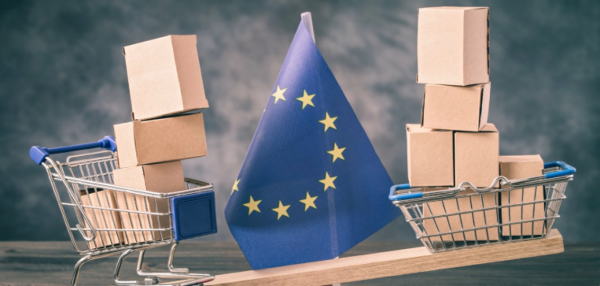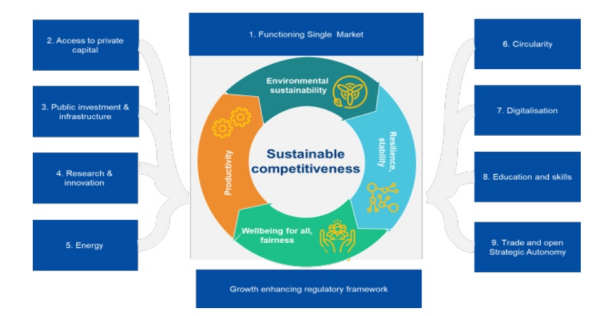CCCEU Weekly Update 16 Feb 2024 | EU commission published the new "Annual Single Market and Competitiveness Report"
Editor's Note: Warm wished from Brussels! This week brought exciting development as the EU commission published the new "Annual Single Market and Competitiveness Report", emphasizing critical need for deeper integration and greater resilience. Meanwhile, the EU Parliament ratified a provisional agreement on artificial intelligence rules. Dive into the insights and have a splendid weekend ahead!

Focus
Despite global economic challenges and geopolitical tensions, the EU Single Market, as one of the world's largest integrated market areas, provides a solid foundation for close cooperation between EU member states and economic recovery.
The European Commission released its Annual Single Market and Competitiveness Report on February 14, which provides an in-depth look at the competitive strengths and challenges of the Europe's Single Market and tracks yearly developments according to the nine competitiveness drivers identified in the EU's 2023 Long-term competitiveness Communication. Those are the functioning of the Single Market, access to private capital, public investment and infrastructure, research and innovation, energy, circularity, digitalisation, education and skills, and trade and open strategic autonomy. The 2023 Communication established a set of Key Performance Indicators to serve as a dashboard of progress regarding these drivers. The report notes that 9 KPIs have improved, against 5 that have disimproved; 3 are stable, and 2 do not yet have new data.

Figure 1. Definition of competitiveness based on nine drivers
The report recalls that the functioning Single Market boosts the EU's economy with a large demand pool, diversified supply sources, opportunities for innovating and scaling up production, strong social rights, and fair working conditions, while serving as a geopolitical lever.
Regarding investment, the report concludes that public investment has recovered from the low levels after the financial crisis, partially thanks to the Recovery and Resilience Facility, while private investment remains high. To increase the availability of risk and venture capital funding and scale up innovative companies, the report recommends to further strengthen the Capital Markets Union, building on the initiatives already approved since 2020.
Regarding research and innovation, the EU's R&I investments have increased from 1.8% of GDP to 2.2% in twenty years but slipped year on year and remain below the target of 3%, and unevenly distributed across regions and Member States. Meanwhile, the scientific publications do not always translate into commercial leadership, often because of the difficulties to scale up business activities in the EU. More efforts are required to support Europe's efforts from lab to fab, such as is being done for semiconductors through the European Chips Act, facilitating research collaboration and providing support through Horizon Europe or the Digital Europe Programme.
Although high energy prices remain a challenge, the report points to important steps taken over the past years in order to update the EU energy policy toolbox and support EU clean tech manufacturing.
Europe is slowly progressing towards a more circular economy. Since 2000, the EU industry's resource productivity63 has increased by 37%, indicating a more efficient use of materials in EU production, but the EU materials footprint remained stable in the last decade.
In terms of digitalization, several funding instruments and legislative initiatives are now in place to enhance the digitalisation of businesses and the competitiveness of the EU information and communication technology sector.
In terms of education and skills, at 74.6% in 2022, the EU is on track to reach its 2030 employment rate target of 78%. And yet, three quarters of SMEs currently face labour and skills shortages, which the Pact for Skills and measures facilitating labour mobility have started to tackle.
The report also notes that the EU is a major trading power accounting for 16% of global exports, and that trade continues to be a source of competitiveness. It also points to the need to defend the level playing field and to protect our economic security.
In fact, the Annual Single Market and Competitiveness report responds to the request of the March 2023 European Council to monitor the state of Europe's Single Market and competitiveness. It builds on previous Annual Single Market reports as first envisaged by the 2020 EU Industrial Strategy.
As to the next steps, the June 2023 European Council announced its plan to hold the first annual progress review on enhancing the Union's competitiveness and increasing productivity and growth at its March 2024 meeting.
The Single Market Scoreboard was first published in 1997 and was initially set up to assess the performance of the Member States on the implementation of Single Market acquis. It was extended over time to cover the use of related governance tools. This year, it includes new competitiveness indicators, in line with the Long-term competitiveness Communication.
Hot Topics
Europe 'getting more dependent on China' for clean tech, EU climate chief warns
Euractiv on 14 February, the the EU's climate chief Wopke Hoekstra said in an interview that Europe is currently too dependent on China in energy saving and energy transition, which will become a "problem" in the future. At present, Europe imports from China a large number of solar panels and other clean energy production facilities, a serious competition to the Europe manufacturers. The relevant industry associations have begun to call on the European Commission to take tariffs, import quotas and other means of restriction, but the Commission has warned that such a move will prevent Europe from reaching energy saving goals.
In addition to solar energy, wind turbine, electric vehicles and other areas of similar problems, local companies can hardly compete with China, Hoekstra stressed that Europe should restore the past in the production of clean energy equipment leading position, and get rid of the import dependence on Chinese products.
Zelenskiy to sign bilateral security agreements with Berlin, Paris
Germany and France will sign bilateral agreements on security commitments with Ukraine on Friday during the visit of Ukrainian President Volodymyr Zelenskiy to their respective capitals, both governments said on Thursday.
A German government spokeswoman said that Scholz and Zelensky will sign a bilateral security agreement on Germany's "long-term security commitment and support" to Ukraine. According to the Reuters, the accord with France was expected to outline a framework for long-term humanitarian and financial aid, support for reconstruction and military assistance. According two diplomats aware of the talks, France plans a 200-million-euro fund for civilian projects to be carried out by French companies.
Ireland, Spain want EU to review Israel's human rights compliance in Gaza
On 14 February local time, El País reported that the Governments of Spain and Ireland had sent a letter to the President of the European Commission, Von der Leyen, requesting that strong measures be taken with regard to "possible human rights violations" by Israel in the Gaza Strip.
In the letter, Spanish Prime Minister Sánchez and Irish Prime Minister Varadkar asked the European Commission to examine whether Israel was fulfilling its humanitarian obligations in the Gaza Strip, and said that if the investigation found that Israel was not fulfilling its relevant humanitarian obligations, measures such as the partial suspension of political and economic relations with Israel should be taken.
EU lawmakers ratify political deal on artificial intelligence rules
Two key groups of lawmakers at the European Parliament on Tuesday ratified a provisional agreement on artificial intelligence rules ahead of a vote by the legislative assembly in April that will pave the way for the world's first legislation on the technology.
Called the AI Act, the new rules aim to set the guardrails for a technology used in a broad swathe of industries, ranging from banking to cars to electronic products and airlines, as well as for security and police purposes.
China's Wang Yi to champion 'equal and orderly multipolar world' at Munich Security Conference
Wang Yi, Chinese Minister of Foreign Affairs, will attend the Munich Security Conference, which runs from February 16 to 18, and will deliver a speech at the China seminar during the conference to explain "China's propositions on building a community with a shared future for mankind and advocating an equal and orderly multipolar world", according to the Chinese Foreign Affairs Ministry website.
Germany now world's third largest economy as Japan loses its spot
CCTV reported that Japan slips into recession, becoming the 4th-largest economy, behind the US, China and now Germany.
For the whole of 2023, Japan's nominal GDP grew 5.7% to come in at 591.48 trillion yen, or $4.2 trillion based on the average exchange rate that year, official data showed. Germany, on the other hand, saw its nominal GDP grow 6.3% to reach 4.12 trillion euros, or $4.46 trillion based on last year's average exchange rate.
What are the experts talking about?
Can the Critical Raw Materials Act support the EU's green industry ambitions?
Source: World Knowledge
Author: Dong Yifan, Department for European Studies, China Institutes of Contemporary International Relations (CICIR)
On November 13, 2023, the Council of the European Union (EU) and the European Parliament (EP) agreed on the Critical Raw Materials Act, marking a key step in the legislative process of the EU's efforts to build the resource pillar of the green and digital industries. However, the future of the EU's pursuit of raw material autonomy and its impact on China are of even greater concern.
Unity in power, power in unity: why the EU needs more integrated electricity markets
Source: Bruegel
Author: Georg Zachmann; Carlos Batlle; Francois Beaude; Christoph Maurer; Monika Morawiecka; Fabien Roques
The energy crisis that started in 2022 reminded European governments of the resilience provided by relatively well-integrated European electricity markets, which have been painstakingly built-up over several decades. European Union leaders thus decided to reverse a creeping energy renationalisation and to invest in completing the internal market.
The multiple benefits of enhanced EU energy-market integration should be emphasised. 'Techno-economic' benefits can be secured from optimising the design and operation of several national electricity systems jointly, rather than individually. These benefits will increase massively with higher shares of renewables and include less fossil-fuel burn and less volatile short-term prices, cost savings through harnessing regional renewables advantages, reduced need for expensive back-up capacity and flexibility, and enhanced resilience to shocks.
In addition, greater energy-market integration will trigger benefits of a more managerialgovernance related nature, though these are harder to quantify. They include benefits in terms of competition, innovation and credibility, which are particularly useful in the electricity sector, which typically faces rather long investment times and high degrees of concentration in purely national markets.
Further market integration requires substantial political investment. Governments will need to deal with significant distributional effects within and between countries. Experience has shown that domestic political constraints in this respect are often numerous and difficult to overcome. Therefore, achieving the benefits of integration will require a vision on what degree of integration is feasible and desirable, and how to properly implement and govern it.
Please note: the English version of this issue is slightly different from our Chinese one. The views and opinions expressed in this article do not necessarily reflect the official position of the CCCEU.

 Login
Login Login
Login CCCEU and Gunnercooke Successfully Host Webinar on CSDDD and FLR Compliance to Guide Chinese Businesses
CCCEU and Gunnercooke Successfully Host Webinar on CSDDD and FLR Compliance to Guide Chinese Businesses Cultivating responsible China-EU business leaders essential to tackling global challenges
Cultivating responsible China-EU business leaders essential to tackling global challenges



